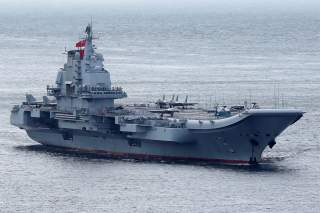China's Aircraft Carrier Just Led a Massive Show of Force in South China Sea
What happens next?
China’s Liaoning carrier group has appeared in the South China Sea off Hainan, satellite photos show, after it was said to pass through the Taiwan Strait, in what analysts are describing as an “unusually large display of the Chinese military’s growing naval might.”
That is according to Reuters, which obtained the photos showing at least 40 ships flanking the aircraft carrier.
In addition to the scale of the exercise, observers said the movements were likely aimed at showing off inter-fleet capabilities.
“Judging by the images, it does seem they are keen to show that elements of the South Sea Fleet are able to routinely join up with the carrier strike group from Dalian in the north,” Collin Koh, a security expert at Singapore’s S Rajaratnam School of International Studies, was quoted as saying.
Recommended: The 5 Biggest Nuclear Bomb Tests (From All 6 Nuclear Powers).
Recommended: How Israel Takes U.S. Weapons and Makes Them Better.
Recommended: North Korea’s Most Lethal Weapon Isn’t Nukes.
“It does seem they want to show inter-fleet interoperability – something the [People’s Liberation Army] Navy has been quietly working on for some time.”
But, Koh added, “while it highlights an extensive ability to deploy, we are still left to guess at the PLAN’s combat readiness.”
The exercise follows reports that the Liaoning carrier group, as well as Chinese fighter jets, passed through the Taiwan Strait and over the Bashi Channel to the south of Taiwan.
It also comes after a US guided-missile destroyer carried out a freedom of navigation operation near an artificial island controlled by China on Friday. China’s Defense Ministry termed the move a provocation, saying that the operation “violated basic rules of international relations, and harmed regional peace and stability.”

